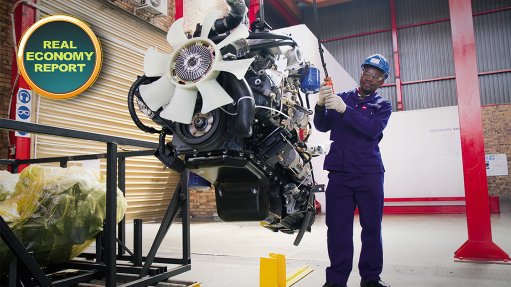
From Creamer Media in Johannesburg, this is the Real Economy Report. Automotive company Hyundai Automotive South Africa recently opened a local commercial vehicle assembly plant, increasing the company’s contribution to the South African economy. Leandi Kolver has the story.
Leandi Kolver:
The 32 000 m2 semi-knocked-down (SKD) assembly plant, which had been established through a R110-million capital investment from Hyundai Automotive South Africa parent company Associated Motor Holdings, has started assembling its first trucks in July this year.
Hyundai Automotive South Africa CEO Alan Ross tells us more.
Hyundai Automotive South Africa CEO Alan Ross:
“This plant is, we opened it this morning, it is an assembly plant, it cost us R110-million and we are going to assembly HD 65 and 70 trucks from Hyundai Motor Company Korea where we have the distribution for and we used to import them and we thought it is now time, a good opportunity to assemble them in our own country.”
“This plant will start off manufacturing 50 to 100 a month, but it has a huge capacity as I mentioned it has another opportunity as well where we are going to assemble approximately, we are going to start off slowly, but 350 to 400 H100, the famous bakkie that you see running around which is for the plumber, gardener, delivery van and it has been around here for a long time. And that is also very exiting because we are going to use this assembly plant here to put those H100s together.
Leandi Kolver:
Department of Trade and Industry (DTI) deputy director-general Garth Strachan elaborates on the importance of this move by Hyundai and what the DTI would expect from the automotive company going forward.
Department of Trade and Industry deputy director-general Garth Strachan:
“The importance is Hyundai as a globally competitive automotive equipment manufacturer for the first time, for a very long time.
“It’s semi knock-down assembly, we are supporting that in the context of the fact that we would like to see the evolution of the assembly to complete knockdown and production with increasing levels of local production. And local component supplier development.
“So it is a very important milestone.”
Shannon de Ryhove:
Other news making headlines this week: African CEOs maintain their bullish view on Africa; The private sector lags behind public sector efforts to create black industrialists; And, Sasol repositions itself for a gas-based future.
The general outlook of CEOs active on the continent has swung from “Afro-pessimism” to a “real Africa realism” and a desire to translate Africa’s abundant market opportunities into viable businesses.
PwC Africa territory senior partner Suresh Kana
Efforts by government to create a class of black industrialists are being hampered by a lack of support by the private sector, which has not been effectively engaged by the Department of Trade and Industry to ensure conceptual buy-in.
Former SABMiller Africa & Asia enterprise development manager Boipelo Nkadimeng
South African energy and chemicals group Sasol has “strategically repositioned” itself over the past three years to focus on gas-based opportunities in Southern Africa and North America, having moved away from coal-to-liquids opportunities in China, Indonesia, India and South Africa.
Sasol Southern African operations executive VP Bernard Klingenberg
That’s Creamer Media’s Real Economy Report. Join us again next week for more news and insight into South Africa’s real economy.